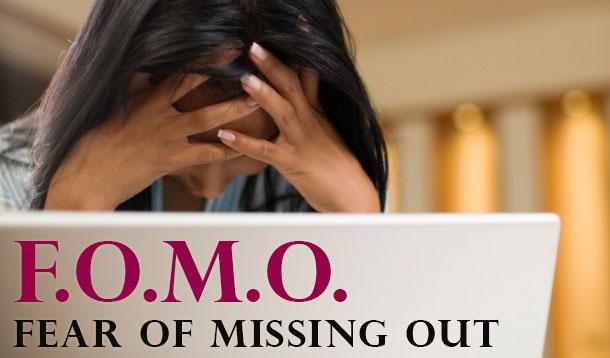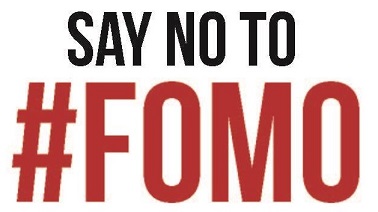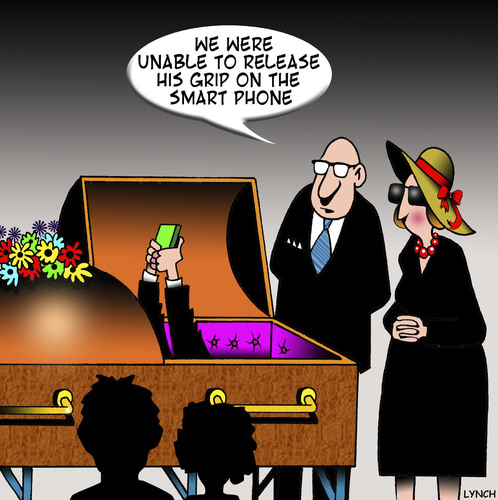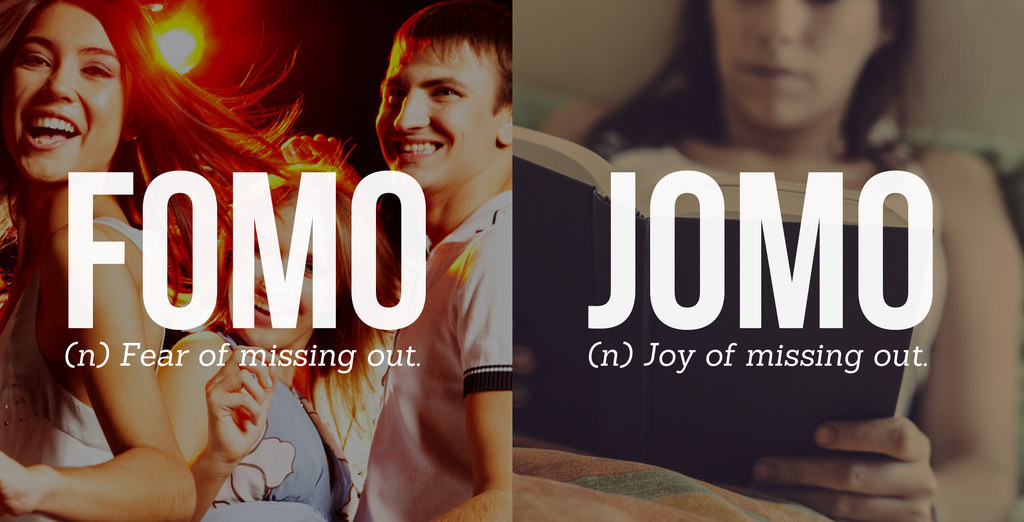#FOMO - What frightens us so much to miss events on the web - and what happens when we constantly update?
Remember a BuzzFeed who was around the dress brought up by the user Tumbler, to ask readers to vote on whether Posted on Tumblr dress what color this dress?
If this is the first time you hear about it, it is important for us to launch reassurance words. Most of us, if not all of us, experienced a situation in which we were not updated.
This was also the case with Amy Chan, 33, whose story appears in LAURA M. HOLSON article at The New York Times. Chan admits that she was momentarily embarrassed when her friends brought up the story of the famous dress and asked her opinion.
Although the picture reached an impressive audience of 38.5 million views, Chan was not among them, and she simply had no idea what her friends were talking about.

Image Credit
This seemingly marginal example represents a broad universal phenomenon. It seems that the need to be updated is even greater since the meteoric rise of social networks and their intense presence in the various circles of our lives.
In fact, the fear of missing out on something so widespread in our region that it has been defined by FOMO (Fear of Missing Out) and in recent years has preoccupied the public and many researchers.
After all, we are exposed to unimaginable amounts of opportunities and information in an infinite range of areas-and even if we dedicate our lives to it, we will not be able to cover them. If we were to accept this, there would be no problem.
So why is it so pressing for us to stay out of Lup until we visit our torch frequently instead of dealing with other things?
And how do you stop working at this 24/7 and make time for life itself?

Image Credit
Even those who are not busy with a constant flutter of virtual interface points with the outside world may find themselves uncomfortable when they are expected to know something that happened while blinking. The name FoMo was given to the phenomenon in 2011 and originally described the anxiety felt by social network readers about parties that they were not invited to. Since then it has also been expanded to a sense of missing information, experiences, events, connections and opportunities. A survey conducted in the United States and the United Kingdom found that most of those born in the 1980s to the 1990s (the Y generation) responded positively to every proposal only because they were afraid to miss some opportunity.
Not All Glittering on Facebook - Is Real
The fear of missing out is raised even when we "come across" (let's face it, we're looking for it) in pictures that show others at perfect moments, or events we'd like to be but we do not and make us feel like we're missing a more cool life.The irony is that we often refresh our torch to be in the loop, but what comes before us - bits of better life, seemingly - makes us feel worse and intensifies the fear of missed opportunity that pushed us there in the first place.
Heather Yamada-Hosley claims in Lifehacker that FoMo is not about the fear of not knowing that something is happening - but about the fact that it happens without us. The anxiety is missing Bonding with our belonging group. In her NPR podcast, it is said that many are afraid that when something is not present there will be something that will shape the group's history in a way that will reduce their belonging to it in the future.
In other words, the fear of missed opportunity and the need for social belonging sometimes intersect. For example, she demonstrates, if we choose to go to a festive family event and on the same day the guys will meet and upload photos to Facebook, we may regret that we are not there, even though we do not regret the trip to the family.
Hossley offers some solutions for similar situations: First, plan quality time with friends, and consider a one-on-one meeting for a stronger connection, in exchange for what we lost; Second, focus on what you do that makes you happy - so push aside the distractions of what your friends do without you right now. Finally, she pleads, it is not necessary to record your entertainment on the social network in real time.

Image Credit
"The best way to skip a FOMO created by a social network is not to enter the social network." It's not easy, she says, we all have some cool moments we want to share with other circles, but try to upload them at the end of the event so you do not get swept up in the swirling spiral with a torch that includes what everyone is doing now when you're not there.
Social anxiety and stress do not disappear completely, she says, even if you have high self-confidence, but these steps can make it easier for us to help us focus on this moment and rejoice in the place we chose to be.
Another reason to avoid FOMO is that often his result is a comparison to others, that is to others as he presents himself on the social network. Eric Barker of Time magazine mentions the argument about Facebook's illusion - the life of others often seems more glamorous than they are. Still, comparison to others is inevitable, even when we know that it does not work in our favor. Barker quote Montesquieu, a French philosopher who lived in the 17th-18th centuries:
"If one only wished to be happy, this could be easily accomplished; but we wish to be happier than other people, and this is always difficult, for we believe others to be happier than they are."
When we are in a place of comparison and feel that we are missing the life we could have, there is a tendency to publish a post of our own, just as if we were announcing:
Hey, I'm here too, look at me!
The problem is Barker, stresses that in addition to the temporary relief he provides us, the particular editing of reality will make others feel worse by comparing it, and thus we continue to spread the virus.
Does this phenomenon tell us something important that we know, Barker wonders, and immediately informs us that
"FOMO is much worse than you think."For him, there is a high probability that if you find yourself in a FOMOswirl, you are probably not very happy with your current life. He refers to the same study from 2013 that correlated fear of missing out with behavioral, emotional, and motivational aspects. FOMO has been defined as
"an unpleasant and sometimes exhausting feeling that you lose - that your friends do, know, or have something better than you."
Found that people with lower levels of satisfaction of basic psychological needs, including a sense of belonging and personal freedom, tended to have higher levels of oxidation anxiety. That is, many go online first thing in the morning to get information or belong to a particular group. Others will watch the whole night (Binge-watching) series for fear of being excluded from the office discourse. The irony is that sometimes these people experience a higher level of loneliness, even though the networks can not replace face-to-face communication, and that staring at pictures of people in a relationship can make us feel even more isolated. In addition, loneliness often fuels the fear of missed opportunity, and so on.
From FOMO To JOMO, The Joy Of Not Knowing
When we understand the impact of social media on us and try to break away, the so-called "digital fast" or even a reduction in the frequency of peeking to the mailboxes and the various nuances, there are advantages to using media - the immediate reward is time released for favorite tasks and experiences that simply do not reach them Otherwise, like reading books. It even has a name, JOMO, the joy of missing out.The name was set by Christina Crook The author of the book "The Joy Of Missing Out" (JOMO). Barker also mentions researchers who argue that it is sometimes good to isolate ourselves from the world of possibilities.
In sum, "If there is a story in the wider cultural context, it is not really that I would lose it ..." as she said in a study, meaning that what really matters is finding her way to it. Is, according to statistics, one in ten who choose to break away due to excess drama or gossip.
Of course, when we break up or update less often, the phantom is startled and cries out,
"And if something important happens just as I'm disappearing from the landscape," making the change more challenging, but possible. Along with increasing awareness of trends and patterns, Barker suggests two additional strategies.
1. Going out of the loop - Focusing attention inwards: Although we often turn to him to improve our feelings, Facebook will not bring us happiness, Barker says.
When our attention is directed to another or "better", he explains, we lose our authentic sense of self.
Thus, "the consistent fear of missing out means that we are not taking part in a real person in our own world."
The key to happiness lies in one words: Attention. He quotes Paul Dolan, author of "Happiness by Design: Change What You Do, Not How You Think" and explains that attention is the glue that connects life, and that our happiness depends on where we turn our attention. "If you are not as happy as you could be, you probably do not draw your attention to the right place ... a change of behavior and an increase in happiness are associated with attracting negativity just as they are related to turning to the positive."
2. Out Of The Loop- Gratitude: The inevitable comparison of the other's non-real life on Facebook makes us feel we have less, Barker says, but an appreciation of what we have makes us feel we have more. He suggests a little experiment: "Look around you, what good things do you take for granted? Home? Family? Friends? Now take a few moments to imagine that these are taken away from you. , You're lucky to have what you have".
In other words, the mental absence of precious moments in our lives makes us appreciate them more, acknowledge them, feel that we have more and be happier. Science reinforces this, he continues. The more grateful a person is, the less likely he becomes to neuroticism and to feel depression, anxiety, loneliness, and jealousy.
Social media is not the devil, Barker stresses, but "we are wired to compare ourselves to others, and we all know where this leads in the medium where everyone circles corners to look their best."
Facebook, for example, can help us be happier if instead of comparing, we will use it to plan face-to-face meetings. Professor John Cassipio, who led a study of loneliness, explained that Facebook is a tool, and as such, its effectiveness depends on the user. "If I use Facebook to plan a football game, for example, it's healthy, but if I turn to Facebook instead of playing with my friends, it probably is not."

Image Credit
The encouraging news is that the tendency to FOMO decreases with age, and at the same time, the comparison to others who nourish and feed by fear of missed opportunity is also reduced. Meanwhile, in this context, Barker presents an argument that can not be ignored: Whenever we spend our time staring at carefully chosen images of happiness, remember one thing: this is your life that you miss.
True, the choice not to be up-to-date with anything that comes up on the net comes with a certain price, but, says Susan Kane, author of the book: "Quiet: The Power of Introverts in a World That Can't Stop Talking", "So for 10 minutes you will have nothing to contribute to the conversation. life goes on".




I have not seen you for a long time @originalworks and @steem-untalented
Hello @nirgf
We have given you our still tinnie-winnie upvote!
You have been spotted by @nirgf to possess rare gem!
So what can we do than to seal the deal, give you our tiny upvote and celebrate you, for everyone has something to offer.
We welcome you to the #untalented family. Feel free to come around for its a home with us. Flaws allowed, so relegate reservations and play with that beautiful mind of yours, let's tap into more hidden aspects of you. No average, no bum, just awesome you and the best version of YOU is a gift to humanity everytime. Stay awesome!
Join the steemgigs community on discord
https://discord.gg/CGuPyyT
#untalented is a branch of @steemgigs. If you would like to offer your service in building the dreams of other steemians, you can do so under #steemgigs.
However, if you want to experience full blown freedom and grow in confidence about your gifts and talents, share under #untalented.
We aim to create historical moments in the genre of touching lives and you can support us if you desire, by voting on steemgigs for witness. Simply click here
https://steemit.com/~witnesses
and type steemgigs in the first search box.

Just incase you find any level or form of gifts, talents, attempts at out-of-the-boxness, or any steemian low in confidence about their abilities, worth, etc; please don't let it slip emptily by.
Kindly call on me! Simply reply to any such post and add @steem-untalented or #untalented to your reply and i will be there to upvote, acknowledge, strengthen and encourage them.
The @OriginalWorks bot has determined this post by @nirgf to be original material and upvoted(1.5%) it!
To call @OriginalWorks, simply reply to any post with @originalworks or !originalworks in your message!
this post reminded me on my insights later years I was writing but the FOMO and JOMO were put is encouraging. Especially remembering gratitude. This post gave an idea to share some information on the recent article I have been reading and share in steemit. thanks @nirgf
Thank you very much, I'm glad you enjoyed reading my post
For more information, click here!!!!
Send minimum 0.050 SBD to bid for votes.
The Minnowhelper team is still looking for investors (Minimum 10 SP), if you are interested in this, read the conditions of how to invest click here!!!
ROI Calculator for Investors click here!!!
@nirgf payed 10.0 SBD to @minnowbooster to buy a stealth upvote.

transaction-id 261b0d6c750c33b7327aa1fc659354aeb638cb4d
@stealthgoat
Life is not a competition! Love this
Thanks for reading and commenting @annhoyblog
I think FOMO is definitely real. I have seen that happening with me :)
it's contagious :) @skysnap
Amaying post my friend
Thank you dear friend
This post was resteemed by @steemvote and received a 40.39% Upvote
This post resteemed by # @bestbot
Thanks @bestbot
We are buying Bitcoins just because we don't want to miss it. "Fear of missing out"
Isn't it @nirgf?
you think so?
I was just kidding.
But I think many people want to invest in cryptocurrencies so they can double their investment in short amount of time.
It's an opportunity for everyone.
People have "FOMO" and it's absolutely true when it comes to Facebook, Whatsapp and Tinder. They want to use it just because everyone using it.
That's just it, the fear of not being up to date with what's happening
Know what everyone is talking about